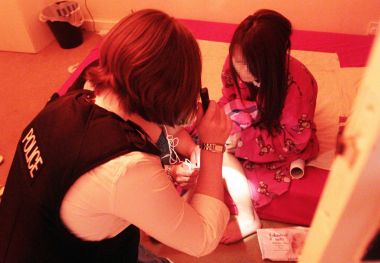Modern Slavery Bill doesn't go far enough, say charities

The Modern Slavery Bill, which receives its third reading in the House of Commons tomorrow, does not go far enough in supporting victims of trafficking, according to charities working in the field.
There has been a broad welcome for the bill, which drastically increases the potential punishments for trafficking and creates an Anti-Slavery Commissioner to co-ordinate the response to slavery. It also introduces a defence for victims of slavery and trafficking compelled to commit criminal offences and makes it possible for courts to order victims compensated from confiscated assets.
The Salvation Army has been operating a Government contract to provide help and support to adult victims of trafficking since July 2011. It told Christian Today in a statement that it "warmly welcomed" the bill and that it was "a positive step towards making the UK a more hostile place for traffickers of people and tackling this horrific crime". But it added: "However, we believe that, as per our recommendations, the bill could have gone further in terms of supporting and protecting victims; for instance, by introducing greater flexibility in the duration of the reflection and recovery period for victims and by ensuring that all victims receive the same level of support, irrespective of their immigration status."
According to a Methodist minister who leads an anti-trafficking organisation, the bill is "a step in the right direction", but more needs to be done to protect victims.
Rev Kerry Scarlett is director of the Adavu Project in Birmingham, which works raise awareness of human trafficking, offers support for victims and co-ordinates the West Midlands Regional Anti Trafficking Network.
She told Christian Today that the bill was "very positive overall": "It has been so difficult for police officers – it has lacked so much clarity and coherence." Under the present system, she said, "There are gaps around victim care and provision. They think they won't be believed. If this means that they think they're more likely to be taken seriously, that's good."
Scarlett said that the government had "gone for what's achievable", adding: "We need to go for that, and then keep pushing. It's about small steps and getting additional means and resources."
She called for more 'joined-up thinking' around the issue, saying: "Victims turn to all sorts of sources for help, like foodbanks and church-run cafes. If they were all working together and sharing information it could help provide a package of support."
Scarlett spoke after a government adviser attacked the bill as a "lost opportunity". Anthony Steen, chair of the Human Trafficking Foundation, told The Guardian that it had "yawning gaps" and failed to focus on the needs of victims of trafficking in the UK. "The bill is wholly and exclusively about law enforcement – but it shouldn't be enforcement-based, it should be victim-based," he said. "We have majored on the wrong thing."
The Home Office said in a statement: "Protecting victims is at the heart of everything we are doing. We purposely published the modern slavery bill in draft form for pre-legislative scrutiny so that we could listen and respond to constructive contributions and concerns. The bill includes provisions to enhance statutory protection for victims while at the same time strengthening measures to disrupt, convict and imprison the criminals involved to prevent people becoming victims in the first place."
The Modern Slavery Bill will go to the Lords for further consideration after tomorrow's reading.











